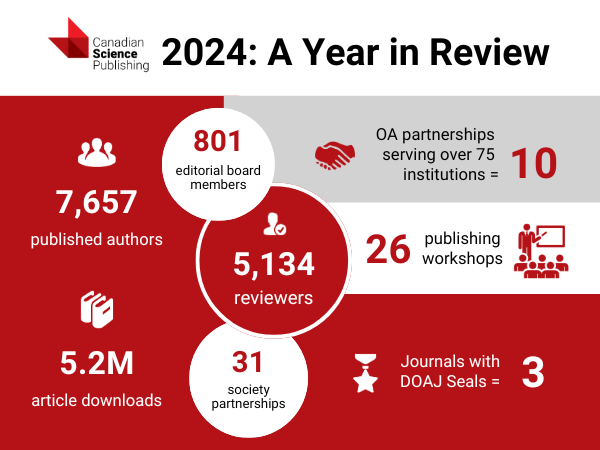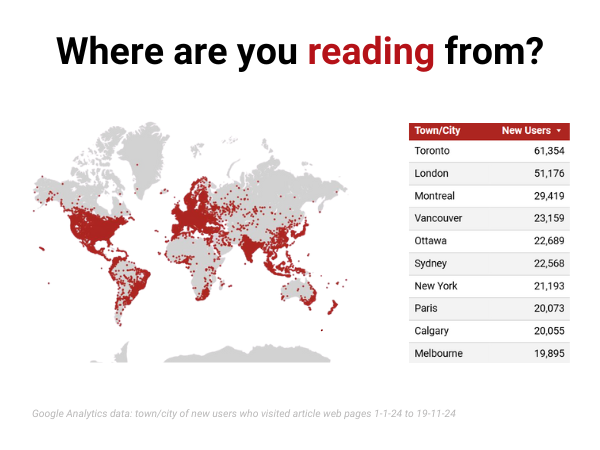As we reflect on 2024, it’s clear that Canadian Science Publishing (CSP) has had an exceptional year of growth, innovation, and collaboration. From launching new partnerships and enhancing our digital presence to empowering early-career researchers and advancing open access, this year has been a defining one for CSP.
Rising to New Heights in 2024
Editorial leadership
As a not-for-profit publisher, we are supported by many researchers, with our Board of Directors, editorial board members, and reviewers generously volunteering their time. We’re deeply grateful for their ongoing involvement with our journals.
After eight successful years of editorial leadership, Jim Germida retired from his position as our Executive Editor-in-Chief and we welcomed Robert Mann into the role. We saw the appointment of several new Editors-in-Chief (EICs) this year, including the renewal of eight EIC terms and the welcoming of nine new EICs, who officially began their terms in November. Our first two newly established workshops for CSP editors were delivered, providing a platform for knowledge-sharing and fostering a strong sense of community among our editorial teams.
Building stronger partnerships
In 2024, we began new partnerships that will empower us to meet market demands with greater agility while preserving the personalized service and attention to detail that has always set us apart from other publishers.
In one of the highlights of the year, FACETS expanded its scope while deepening its relationship with the Royal Society of Canada (RSC), inviting multidisciplinary contributions in the social sciences alongside the launch the newly developed RSC Reviewer Board. FACETS also began a new partnership with the Intersectoral Centre for Endocrine Disruptor Analysis (ICEDA), to promote endocrine research and offer workshops to ICEDA members. Additionally, a new partnership between the Canadian Journal of Earth Sciences and FACETS with the Canadian Society of Vertebrate Palaeontology (CSVP) will showcase and amplify the impactful work of CSVP members.
Our collaborative efforts extend beyond individual journals. In partnership with our 31 affiliated societies, we’ve developed a variety of author and peer-review workshops and launched initiatives to engage early-career researchers as reviewers and editorial board members. We also joined forces with Iva Cheung and the Science Writers and Communicators of Canada to co-host a workshop on the use of plain language in science communication.
New opportunities for researchers to share and preserve their work emerged through our partnership with Dryad, which allows authors publishing in FACETS, Arctic Science, Drone Systems and Applications, and the Canadian Journal of Fisheries and Aquatic Sciences to archive the data underlying their research for free. We also joined the OA Switchboard, streamlining the management of our open-access content and improving our operational efficiency.
We also took steps into new publishing territory through our new book program in partnership with the University of Toronto Press (UTP). Together, we’re producing a list of science books that address critical scientific questions of our time in areas such as Arctic science, climate, biodiversity and conservation science, and ocean and aquatic sciences.
Recognizing the importance of data sharing, we endorsed the Joint statement of the STM Association, Crossref, and DataCite on Best Practises in Data Sharing. By supporting this statement, we aim to accelerate the adoption of effective data-sharing practices and encourage further development of critical policies in collaboration with a wide group of stakeholders.
A new collaboration with the Impact Hub in Ottawa, Ontario provides our team with access to essential tools, mentorship, and peer networks.
We’re excited to continue working alongside these organizations to enhance the reach and impact of our journals.
Empowering early career researchers
Throughout 2024, we’ve prioritized engaging and empowering early-career researchers (ECRs) by providing them with valuable opportunities to contribute to the scientific community. Our initiatives include:
- New ECR programs for early-career reviewers and editorial assistants, including opportunities with Canadian Journal of Fisheries and Aquatic Sciences, Canadian Journal of Zoology, Environmental Reviews, and FACETS.
- Establishment of ECR Editorial Boards for Botany and Canadian Journal of Earth Sciences, giving ECRs the chance to hone their editorial skills and contribute to shaping the future of their respective fields.
A strong focus on open science and open access
Our commitment to open access publishing continues to grow. This year, we published over 20 per cent more open access articles than in 2023, reflecting our dedication to making high-quality, peer-reviewed research accessible to our readers around the globe.
The number of open access partnerships continues to increase, providing open access publishing opportunities and access to subscription content for more than 75 institutions. Our partners include the Canadian Research Knowledge Network (representing 43 Canadian universities), Federal Science Libraries Network (including Agriculture and Agri-food Canada, Environment and Climate Change Canada, Fisheries and Oceans Canada, Health Canada, National Research Council Canada, Natural Resources Canada, and Public Health Agency Canada), and California Digital Library, ETH Zurich, the University of Olso, Clemson University, James Cook University, Tulane University, University of Florida, and University of Oklahoma. The Open Access Partnership page of our website includes a full list of participating organizations in our OA partnerships and read-and-publish agreements. We also partner with Research4Life, which provides free or highly discounted publishing in our open access journals for researchers from lower-income countries.
In October, we participated in Open Access Week by hosting a webinar themed “Navigating the Path to Publication” and several in-person seminars at various universities across Canada. These sessions gave an overview of the publication process and offered guidance on how authors can navigate open access and open data requirements. Participating institutions included Carleton University, McGill University, University of Alberta, University of British Columbia, University of Ottawa, University of Toronto, University of Windsor, University of Victoria, and Wilfred Laurier University.
In support of Open Science, a new data and code policy came into effect for the Canadian Journal of Fisheries and Aquatic Sciences and the Canadian Journal of Physiology and Pharmacology.
Expanding our digital presence
Digital engagement and social media have been pivotal to our growth this year. We launched 15 new journal-specific social media accounts. This enhanced visibility helps us connect with our global audience, share impactful research, and provide opportunities for dialogue across the scientific community. As researchers flock to BlueSky to promote their work and connect with colleagues, we’ve recently joined the platform and look forward to building a community there in the coming months.
Our full suite of journals joined ResearchGate, increasing visibility and broadening the reach of the science being published in our journals, and attracting new authors and readers. A newly added feature clearly indicates where researchers can benefit from funding opportunities available through our read-and-publish agreements.
Advancing the publishing landscape
The STM Association invited us to present a case study on “Transforming the landscape of community-engaged research” to share our guidelines for community-engaged research and explain how we’re transforming community-engaged research through transparent and responsible research reporting and inclusive authorship.
A poster on “The Challenges and Opportunities of an Open Future for Small Publishers” was presented during the annual Society for Scholarly Publishing Conference.
We became a member of the Canadian Persistent Identifier Advisory Committee (CPIDAC), which is working to develop a national persistent identifier (PID) strategy for Canada.
As part of our commitment to transparency and community engagement, we launched a Peer Review Week blog series, highlighting the importance of peer review in ensuring the integrity and quality of scientific research.
A new ‘Perspectives‘ section became available in the Canadian Journal of Soil Science and the Canadian Journal of Animal Science began inviting ‘Methods’ papers.
Amidst the hard work, we had some fun too! To celebrate Halloween, we launched the Canadian Journal of Zombie Science, a lighthearted initiative that showcased real science with a humorous twist. This fake journal, full of real scientific research, was a playful way to engage our community amidst turbulent times in scholarly publishing.
What’s next?
As we approach 2025, we’re excited to further expand the scope of our publishing portfolio. New society partnerships and several new open access agreements will begin in January, offering researchers more reading, publishing, and funding options. Stay tuned for more details in the new year!
Canadian Science Publishing is on a journey to become a fully open-access publisher.
A grateful acknowledgement
We owe much of our success to our incredible community of editors, reviewers, researchers, and partners. Your collaboration, feedback, and dedication are the backbone of CSP’s continued growth and success. As we look forward to 2025, we remain committed to fostering a supportive, inclusive, and innovative environment where science can thrive. Here’s to another year of achievement, growth, and meaningful contributions to the scientific community. Thank you for being a part of our journey!







